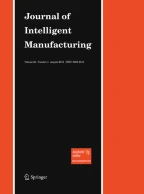Abstract
This paper proposes a novel hidden Markov model (HMM) based on simulated annealing (SA) algorithm and expectation maximization (EM) algorithm for machinery diagnosis. As traditional HMM is sensitive to initial values and EM is easy to trap into a local optimization, SA is combined to improve HMM which can overcome local optimization searching problem. The proposed HMM has strong ability of global convergence, and optimizes the process of parameters estimation. Finally, through a case study, the computation results illustrate this SAEM-HMM has high efficiency and accuracy, which could help machinery diagnosis in practical.
Similar content being viewed by others
References
Boutros, T., & Liang, M. (2011). Detection and diagnosis of bearing and cutting tool faults using hidden Markov models. Mechanical Systems and Signal Processing, 25(6), 2102–2124.
Bunks, C., McCarthy, D., & Al-Ani, T. (2000). Condition-based maintenance of machines using hidden Markov models. Mechanical Systems and Signal Processing, 14(4), 597–612.
Chilengue, Z., Dente, J. A., & Costa Branco, P. J. (2011). An artificial immune system approach for fault detection in the stator and rotor circuits of induction machines. Electric Power Systems Research, 81(1), 158–169.
Deng, C., Sun, Y., Li, R., Wang, Y., & Xiong, Y. (2013). Hidden Markov model based on the heavy-duty CNC health state estimate. Computer Integrated Manufacturing Systems, 19(3), 552–558.
Dong, M., & He, D. (2007). Hidden semi-Markov model-based methodology for multi-sensor equipment health diagnosis and prognosis. European Journal of Operational Research, 178(3), 858–878.
Dong, M., & Peng, Y. (2011). Equipment PHM using non-stationary segmental hidden semi-Markov model. Robotics and Computer-Integrated Manufacturing, 27(3), 581–590.
Gong, X., Feng, Y., Tan, J., & Jia, W. (2012). Fault diagnosis based on spatial structure hidden Markov model. Computer Integrated Manufacturing Systems, 18(1), 132–139.
Han, Q. (2012). Researches on fault diagnosis of complex mechanical systems based on hidden Markov model and EM algorithm. Wuhan: Huazhong University of Science and Technology.
Huda, S., Yearwood, J., & Togneri, R. (2009). A stochastic version of expectation maximization algorithm for better estimation of hidden Markov model. Pattern Recognition Letters, 30, 1301–1309.
Huda, S., Yearwood, J., & Togneri, R. (2014). Hybrid metaheuristic approaches to the expectation maximization for estimation of the hidden Markov model for signal modeling. IEEE Transactions on Cybernetics, 44(10), 1962–1977.
Laurentys, C. A., Palhares, R. M., & Caminhas, W. M. (2011). A novel artificial immune system for fault behavior detection. Expert Systems with Applications, 38(6), 6957–6966.
Lee, J., & Park, C. (2006). Training hidden Markov models by hybrid simulated annealing for visual speech recognition. In IEEE International conference on systems, man and cybernetics. SMC ’06 (Vol. 1, pp. 198–202).
Li, D., & Liao, W. (2015). Application of unbiased Grey–Fuzzy-Markov Chain in equipment degradation prediction. China Science Paper, 10(4), 451–456.
Liang, P. (2013). Human behavior recognition based on GA–HMM. Electronic Test, Z2, 88–90.
Liao, W. (2011). Research of predictive maintenance policy and integrated production scheduling model based on machine degradation. Shanghai: Shanghai Jiao Tong University.
Njike, A., & Pellerin, R. (2012). Simultaneous control of maintenance and production rates of a manufacturing system with defective products. Journal of Intelligent Manufacturing, 23(2), 323–332.
Pan, E., Liao, W. Z., & Xi, L. (2012). A single machine-based scheduling optimisation model integrated with preventive maintenance policy for maximising the availability. International Journal of Industrial and Systems Engineering, 10(4), 451–469.
Peng, Y., Dong, M., & Zuo, M. J. (2010). Current status of machine prognostics in condition based maintenance: A review. International Journal of Advanced Manufacturing Technology, 50(1–4), 297–313.
Schutz, J., Rezg, N., & Léger, B. (2011). Periodic and sequential preventive maintenance policies over a finite planning horizon with a dynamic failure law. Journal of Intelligent Manufacturing, 22(4), 523–532.
Thanh, T., Florent, C., & Christophe, B. (2014). Hidden Markov models for diagnostics and prognostics of systems under multiple deterioration modes. In European safety and reliability conference—ESREL (pp. 1197–1204).
Wang, Q., Chen, H., & Wang, T. (2009). Multi-class support vector machine for fault diagnosis. Electric Machines and Control, 13(2), 302–306.
West, G., McArthur, S., & Towle, D. (2012). Industrial implementation of intelligent system techniques for nuclear power plant condition monitoring. Expert Systems with Applications, 39(8), 7432–7440.
Xia, L., Fang, H. J., & Zhang, H. (2013). HMM based modeling and health condition assessment for degradation process. In 25th Chinese control and decision conference (CCDC) (pp. 2945–2948).
Xu, H., Fan, Y., Wu, J., Gao, Y., & Yu, Z. (2015). Bearing fault diagnosis method based on singular value decomposition and hidden Markov model. In Control and decision conference (CCDC), 2015 27th. IEEE (pp. 6355–6359).
Yu, G., Qiu, H., Djurdjanovic, D., & Jay, L. (2006). Feature signature prediction of a boring process using neural network modeling with confidence bounds. The International Journal of Advanced Manufacturing Technology, 30, 614–621.
Yuwono, M., Qin, Y., Zhou, J., Guo, Y., Celler, B. G., & Su, S. W. (2015). Automatic bearing fault diagnosis using particle swarm clustering and hidden Markov model. Engineering Applications of Artificial Intelligence, 47, 88–100.
Zhou, H., Chen, J., Dong, G., & Wang, R. (2015). Detection and diagnosis of bearing faults using shift-invariant dictionary learning and hidden Markov model. Mechanical Systems & Signal Processing, 72, 65–79.
Acknowledgments
The authors would like to thank anonymous referees for their remarkable comments and great support by National Natural Science Foundation of China (71301176) and Doctoral Program of Higher Education of China (No. 20130191120001).
Author information
Authors and Affiliations
Corresponding author
Rights and permissions
About this article
Cite this article
Liao, W., Li, D. & Cui, S. A heuristic optimization algorithm for HMM based on SA and EM in machinery diagnosis. J Intell Manuf 29, 1845–1857 (2018). https://doi.org/10.1007/s10845-016-1222-1
Received:
Accepted:
Published:
Issue Date:
DOI: https://doi.org/10.1007/s10845-016-1222-1
